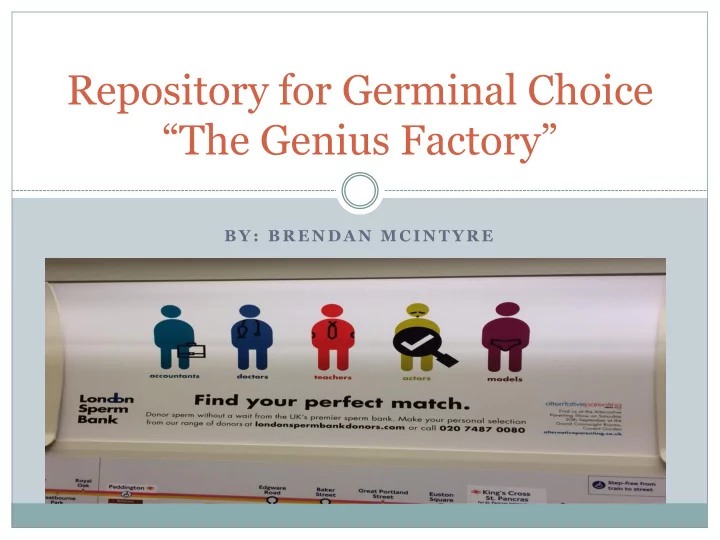

Repository for Germinal Choice “The Genius Factory” B Y : B R E N D A N M C I N T Y R E
Robert Klark Graham • Born June 6 th , 1906 • Became a millionaire after creating shatterproof glasses • Highly reputed eugenicist • Began collecting sperm in an underground bunker underneath a ranch near San Diego • Officially began the “Repository for Germinal Choice” (RFGC) in 1980. • Died on February 13 th , 1997
“Nobel Prize Sperm Bank,” What is It? Not an actual building at first Collection of sperm stored in a bunker in Escondido, CA A “pet project” of Robert Graham Intended to collect and store sperm only from Nobel prize laureates Originally named after Herman J Muller
Requirements for Donors Original requirements were very strict Must have won the Nobel Prize Eventually lowered to allow scientists and researchers to donate Were considered “future Nobel laureates” Due to lack of success, Paul Smith, a worker at the Repository, was sent to recruit college students Near the end of the sperm bank’s existence, artists, athletes, and businessmen were allowed to donate
Requirements for Recipients Originally, women had to be part of Mensa to receive sperm Proven to be false Later, women on any intellectual level could receive sperm. Requirements Included Must be married Must have husbands approval Can not be homosexual Only two women were reported to be refused sperm
Controversy: William Shockley An American physicist and inventor. Won the Nobel Prize for Physics in 1956 The only Nobel Prize Laureate who donated sperm and openly admitted that he did so Had extreme political views on the subjects of race and eugenics Due to his beliefs, other Nobel Prize laureates dropped out from donating. Shockley’s interaction with the sperm bank brought bad press
Controversy: Robert Graham Press began reporting on the sperm bank Brought a lot of negative attention towards Robert Graham and the Repository. People began insulting Robert Graham and picketing the sperm bank Many potential donors refused to donate. This controversy is believed to be the start of the downfall for the sperm bank
End of the Nobel Prize Sperm Bank Graham continued to manage his sperm bank until 1996, when he died After his death, the responsibilities of the bank were passed on to Floyd Kimble Kimble managed the bank for one year, before he too, died The relatives of both Kimble and Graham then decided to shut down the sperm bank All collected sperm was destroyed, and the documentation for the bank remained unfounded. In the end, 229 children were believed to be created from the sperm bank
The Positives about the RFGC Changed the nature of sperm banks Influenced the debate of positive eugenics Influenced the talk of nature vs. nurture
Interview with Robert Graham https://www.youtube.com/watch?v=6Y79Kpy4IYA
Nature vs. Nurture Debate Nature: The intelligence of a person is determined primarily by their genetics. Nurture: The intelligence of a person is determined primarily by their upbrining Graham believed that genetics (nature) plays the greatest role in a person’s intelligence.
Discussion Question #1 Do you believe that the intelligence of a person is determined more by genetics or by their upbringing? Or do you believe that it is both equally? Explain
Eugenics Eugenics The belief that the human species can be improved through breeding Negative Eugenics The human species can be improved by discouraging individuals with socially unacceptable qualities from breeding Positive Eugenics The human species can be improved by encouraging those with desirable traits to breed and reproduce What Graham believed
Discussion Question #2 Do you believe that eugenics as a whole is ethically right, or should nature be allowed to “take it’s course”? How about Negative Eugenics? Positive?
Citations Plotz, D. (2005). The genius factory: The curious history of the Nobel Prize sperm bank. New York: Random House. Plotz , D. (2001). “The “genius babies,” and how they grew” . Slate. Retrieved March 5, 2016 Plotz, D. (2001). “ The “genius babies” grow up”. Slate. Retrieved March 5, 2016 Plotz , D. (2001). “The myths of the Nobel sperm bank”. Slate. Retrieved March 6, 2016 Plotz , D. (2005). “Darwin’s engineer”. Los Angeles Times Magazine. Retrieved March 9, 2016 Olding , P. (2006). “The genius sperm bank”. BBCNews. Retrieved March 10, 2016 “William Shockley”. IEEE Global History Network. IEEE. Retrieved March 7, 2016
Recommend
More recommend